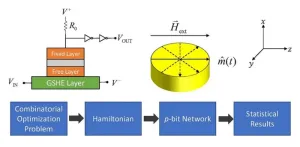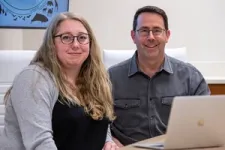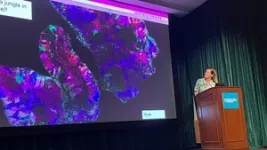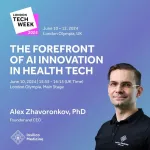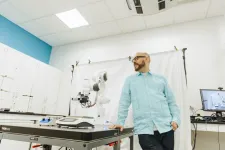(Press-News.org) According to computational complexity theory, mathematical problems have different levels of difficulty in the context of their solvability. While a classical computer can solve some problems (P) in polynomial time — i.e., the time required for solving P is a polynomial function of the input size — it often fails to solve NP problems that scale exponentially with the problem size and thus cannot be solved in polynomial time. Classical computers based on semiconductor devices are, therefore, inadequate for solving sufficiently large NP problems.
In this regard, quantum computers are considered promising as they can perform a large number of operations in parallel. This, in turn, speeds up the NP problem-solving process. However, many physical implementations are highly sensitive to thermal fluctuations. As a result, quantum computers often demand stringent experimental conditions such extremely low temperatures for their implementation, making their fabrication complicated and expensive.
Fortunately, there is a lesser-known and as-yet underexplored alternative to quantum computing, known as probabilistic computing. Probabilistic computing utilizes what are called “stochastic nanodevices,” whose operations rely on thermal fluctuations, to solve NP problems efficiently. Unlike in the case of quantum computers, thermal fluctuations facilitate problem solving in probabilistic computing. As a result, probabilistic computing is, in fact, easier to implement in real life!
Shedding much-needed light on this potential alternative, a group of researchers have now demonstrated the capabilities of probabilistic computing by simulating stochastic nanodevice networks to solve specific NP problems. The study, led by Professor Peter Bermel from Purdue University, is published in the Journal of Photonics for Energy (JPE).
The researchers used the “Ising model,” a canonical model for simulating a wide variety of physical as well as mathematical problems. Originally devised to model the interactions of magnetic dipole moments of atomic spins, its energy operator, namely the “Hamiltonian,” can also represent NP problems. Essentially, solving an NP problem amounts to solving the corresponding Ising Hamiltonian. Probabilistic computing devices made of networks of optical parametric oscillators (OPOs) and stochastic circular nanomagnets with low thermal barriers have been used to solve such problems.
The researchers implemented one such nanomagnet network using existing fabrication methods. They then used it to solve the Ising Hamiltonians of four NP-complete problems (problems with no efficient solution algorithm) from number theory associated with combinatorial optimization. These included number partitioning, exact cover, binary integer linear programming, and integer linear programming.
The simulation results of the first three problems with 3, 3, and 6 probabilistic bits (p-bits) strongly agreed with the theoretical solution (Boltzmann law) of the Ising model. The researchers observed a similar agreement between modeling and theory in the simulations of five different exact cover problems with 3, 6, 9, 12, and 15 p-bits. This indicated the potential for scaling up probabilistic computing frameworks.
According to Bermel, “in probabilistic computing, efficient scaling with problem size is the key to make it a robust, relevant alternative to classical computing techniques. Both modeling and experiments will be needed to confirm which approaches are most promising.”
While the simulation results reported show robust results for all p-bits (from 3 to 15), the researchers suggest that parallel algorithms could help further scale up the simulation capability. In cases where parallelism is not feasible, transitioning from nanomagnet to OPO networks could facilitate efficient problem solving. The system can be mapped on an OPO network and easily implemented with current fabrication techniques, such as the CMOS technology. This, in turn, can lead to the development of stochastic nanomagnets with low energy barriers for probabilistic computing.
JPE Editor-in-Chief Sean Shaheen of University Colorado Boulder remarks, “Developing unconventional forms of computing hardware is becoming increasingly important as AI and scientific/enterprise computing accelerate in scale, at a pace that brings significant — if not urgent – concerns about their energy consumption and carbon footprint. This work by Zhu, Xi, and Bermel provides a practical pathway to a hardware platform that solves an important class of NP-complete problems. By creatively harnessing networks of nonlinear optical devices to carry out Ising computing, the work demonstrates a scalable, energy-efficient approach that has the potential to vastly outperform conventional hardware in solving computationally complex problems.”
While predicting which technologies will emerge as winners is difficult, it is a good bet that the future computing systems will be much more diverse than they are now, and approaches such as stochastic computing can play an important role in this exciting future!
Read the original article by J. Zhu, Z. Xie, and P. Bermel, “Numerical simulation of probabilistic computing to NP-complete number theory problems,” J. Photon. Energy 13(2) 028501 (2023), doi 10.1117/1.JPE.13.028501.
END
Solving computationally complex problems with probabilistic computing
Researchers propose a scalable, energy-efficient computing approach using stochastic nanodevices as artificial neurons to solve combinatorial optimization problems
2023-04-28
ELSE PRESS RELEASES FROM THIS DATE:
York University leads $318.4M first-of-kind inclusive next-gen technology research initiative
2023-04-28
TORONTO, April 28, 2023 — Is an equitable world that includes humans and machines possible? York University researchers believe it must be and have set out to make it so through a first of its kind interdisciplinary research initiative called Connected Minds: Neural and Machine Systems for a Healthy, Just Society.
From universities to industries, hospitals and policymakers, artists and Indigenous communities, York’s Connected Minds will engage 50+ community partners and research collaborators over seven years supported by a historic $318.4 million in funding. Connected Minds has received a combined $105.7 million from the Canada First Research ...
Shocking implications of electric fishes’ tailless sperm
2023-04-28
Betting on tailless sperm that evolved from brave swimmers to hapless floaters seems like a crazy evolutionary gamble, but a group of fish seems to have done just that. Understanding that tradeoff holds promise to shed light on human disease and shake up biology lessons on traditional gender roles.
Michigan State University associate professor of integrative biology Jason Gallant and colleagues are using nearly $1 million from the National Science Foundation to understand the implications from a small African fish which ...
Insilico Medicine founder and CEO Alex Zhavoronkov, Ph.D., presents at LSX World Congress
2023-04-28
Alex Zhavoronkov, PhD, founder and CEO of Insilico Medicine (“Insilico”) will present at the 9th LSX World Congress happening in London May 3 and May 4. Zhavoronkov, an expert in generative artificial intelligence (AI) for drug discovery, will present on May 3, 2:45pm (London time) on “‘Death By Pilot’” to Asset Licensing – the Evolution of Pharma-AIDD Partnerships” as part of the Biotech Growth CEO Forum and on May 4, 9:30am (London time) on “Building a Galvanizing ...
Texas Neurologist and Professor elected New American Academy of Neurology President
2023-04-28
MINNEAPOLIS – The American Academy of Neurology (AAN), the world’s largest professional association of neurologists and neuroscience professionals, has elected as its 38th president Carlayne E. Jackson, MD, FAAN, a neurologist, researcher and professor of neurology and otolaryngology at the University of Texas Health Science Center at San Antonio. Jackson succeeds Orly Avitzur, MD, MBA, FAAN, who completed her two-year term as president during the recent AAN Annual Meeting.
“It’s humbling to have been chosen by my colleagues to follow such talented and dedicated individuals ...
First comprehensive care plan to prevent preeclampsia published in the American Journal of Obstetrics and Gynecology
2023-04-28
Recommendations for high-risk expecting parents and health care providers to promote the prevention of preeclampsia, a leading cause of pregnancy-related death in the United States
SAN FRANCISCO - April 28, 2023 – A new special report published in the American Journal of Obstetrics and Gynecology (AJOG) provides a groundbreaking approach to preeclampsia, one of the most pressing issues in maternal health today, and will translate the prediction of risk into prevention of disease.
The report, ...
Max-difference maximization criterion: A feature selection method for text categorization
2023-04-28
For text categorization, it is necessary to select a set of features(terms) with high discrimination by using feature selection. In text feature selection, Accuracy2(ACC2)treats terms with same absolute document rate difference but different discrimination equally, which is unreasonable. Existing improved methods (normalized difference measure(NDM), max-min ratio(MMR)and trigonometric comparison measure(TCM)) based on ACC2 may confuse the importance of rare and sparse terms on account of challenge for parameter selection.
To solve the problems, a research team led by Li Zhang published their new research on 15 February 2023 in Frontiers of Computer Science co-published ...
U of T receives $200-million grant to support Acceleration Consortium's ‘self-driving labs’ research
2023-04-28
The University of Toronto has been awarded a $200-million grant from the Canada First Research Excellence Fund (CFREF) to revolutionize the speed and impact of scientific discovery through its Acceleration Consortium. The funding – the largest federal research grant ever awarded to a Canadian university – will support the consortium’s work on “self-driving labs” that combine artificial intelligence, robotics and advanced computing to discover new materials and molecules in a fraction of the usual time and cost. Applications include everything from life-saving medications ...
Scientists identify antivirals that could combat emerging infectious diseases
2023-04-28
A new study has identified potential broad-spectrum antiviral agents that can target multiple families of RNA viruses that continue to pose a significant threat for future pandemics. The study, led by Gustavo Garcia Jr. in the UCLA Department of Molecular and Medical Pharmacology, tested a library of innate immune agonists that work by targeting pathogen recognition receptors, and found several agents that showed promise, including one that exhibited potent antiviral activity against members of RNA viral families.
The ongoing SARS-CoV-2 pandemic, which ...
Study finds ChatGTP outperforms physicians in providing high-quality, empathetic advice to patient questions
2023-04-28
La Jolla, Calif. (April 28, 2023) — There has been widespread speculation about how advances in artificial intelligence (AI) assistants like ChatGPT could be used in medicine.
A new study published in JAMA Internal Medicine led by Dr. John W. Ayers from the Qualcomm Institute within the University of California San Diego provides an early glimpse into the role that AI assistants could play in medicine. The study compared written responses from physicians and those from ChatGPT to real-world health questions. A panel of licensed healthcare professionals preferred ChatGPT’s responses 79% of the time and rated ChatGPT’s responses as higher quality ...
Structured exploration allows biological brains to learn faster than AI
2023-04-28
Neuroscientists have uncovered how exploratory actions enable animals to learn their spatial environment more efficiently. Their findings could help build better AI agents that can learn faster and require less experience.
Researchers at the Sainsbury Wellcome Centre and Gatsby Computational Neuroscience Unit at UCL found the instinctual exploratory runs that animals carry out are not random. These purposeful actions allow mice to learn a map of the world efficiently. The study, published today in Neuron, describes how ...
LAST 30 PRESS RELEASES:
Reconstructing the world’s ant diversity in 3D
UMD entomologist helps bring the world’s ant diversity to life in 3D imagery
ESA’s Mars orbiters watch solar superstorm hit the Red Planet
The secret lives of catalysts: How microscopic networks power reactions
Molecular ‘catapult’ fires electrons at the limits of physics
Researcher finds evidence supporting sucrose can help manage painful procedures in infants
New study identifies key factors supporting indigenous well-being
Bureaucracy Index 2026: Business sector hit hardest
ECMWF’s portable global forecasting model OpenIFS now available for all
Yale study challenges notion that aging means decline, finds many older adults improve over time
Korean researchers enable early detection of brain disorders with a single drop of saliva!
Swipe right, but safer
Duke-NUS scientists identify more effective way to detect poultry viruses in live markets
Low-intensity treadmill exercise preconditioning mitigates post-stroke injury in mouse models
How moss helped solve a grave-robbing mystery
How much sleep do teens get? Six-seven hours.
Patients regain weight rapidly after stopping weight loss drugs – but still keep off a quarter of weight lost
GLP-1 diabetes drugs linked to reduced risk of addiction and substance-related death
Councils face industry legal threats for campaigns warning against wood burning stoves
GLP-1 medications get at the heart of addiction: study
Global trauma study highlights shared learning as interest in whole blood resurges
Almost a third of Gen Z men agree a wife should obey her husband
Trapping light on thermal photodetectors shatters speed records
New review highlights the future of tubular solid oxide fuel cells for clean energy systems
Pig farm ammonia pollution may indirectly accelerate climate warming, new study finds
Modified biochar helps compost retain nitrogen and build richer soil organic matter
First gene regulation clinical trials for epilepsy show promising results
Life-changing drug identified for children with rare epilepsy
Husker researchers collaborate to explore fear of spiders
Mayo Clinic researchers discover hidden brain map that may improve epilepsy care
[Press-News.org] Solving computationally complex problems with probabilistic computingResearchers propose a scalable, energy-efficient computing approach using stochastic nanodevices as artificial neurons to solve combinatorial optimization problems
